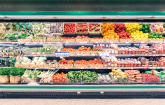
Store brands prices stay hot during the coldest months, saving shoppers 30% on average
NEW YORK, Feb. 12, 2013 /PRNewswire-USNewswire/ -- A new pricing study compares a winter grocery list of store brand products vs. national brands and finds that consumers could save more than 30%, on average, by making a switch to their supermarket's private label.
The research is the latest in a series of studies conducted by the Private Label Manufacturers Association. It looked at a range of basic food and non-food items that an average family might put on the shopping list during a season when most are trying to stay warm and fight off the flu. The study tracked pricing for 35 grocery items over a four-week period at a conventional supermarket. Traditional over-the-counter drugs such as cough syrup, cold medicines and facial tissues were among the non-food items included, along with hot food items like oatmeal, hot chocolate and chili.
(To download a .pdf of the full release and price comparison chart for the sample market basket, click here).
The study results indicate that consumers who choose the retailer's brand for products on the list rather than the national brand could save, on average, $39.49 off their total market basket – a savings of 30.1%. When buying national brands, the total bill came to $131.17 on average over four separate trips, while the same purchases for the retailer's brands cost $91.68.
For every category, a leading national brand was compared to a similar store brand product and prices were adjusted to account for all known discounts, coupons and promotions available. The survey took place over a four week period in a typical supermarket located in the northeast.
Among individual food items the cost savings ranged as high as 62% for white sandwich bread, 48% for macaroni and cheese, and 47% for hot chocolate. Savings on average for non-food categories were led by sinus spray (the store brand version cost a full 53% less), body lotion (36% less), and cold medicine (30% less).
Store brands have increased both in sales volume and consumer acceptance according to the latest industry statistics, adding $11 billion in supermarket sales alone over the past four years. The products today account for nearly one in four grocery products sold.
While the PLMA study was limited to a single store located in the northeast, Consumer Reports magazine reported in late 2012 that a family spending $100 a week on groceries could save $1,500 a year or more by choosing store brands instead of national brands – based on a more extensive price survey at five grocery chains.
The Private Label Manufacturers Association is the industry trade association devoted exclusively to store brands. Founded in 1979, PLMA today represents 3,300 companies who are involved in the manufacture and distribution of store brand products. The products supplied by PLMA members include food, beverages, snacks, health and beauty aids, over-the-counter drugs, household cleaners and chemicals, outdoor and leisure products, auto aftercare and general merchandise.
Available Topic Expert(s): For information on the listed expert(s), click appropriate link.
Brian Sharoff
http://www.profnetconnect.com/brian_sharoff
SOURCE Private Label Manufacturers Association






Share this article